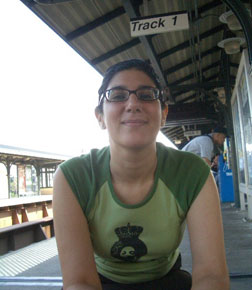As the world remains riveted to breaking news of the Middle East conflict, for some the reality hits closer to home. Keren Schwartz, a senior staff engineer at Langan Engineering and Environmental Services in New York City, checks the Israeli news every morning before calling her parents who live in Bat Yam, Israel, a small town south of Tel Aviv. She wants to know if terrorist attacks occurred near family and friends. Most mornings, her worries subside once she finds no incidents have occurred. But on June 25, violence escalated when Hamas-linked militants killed two soldiers and kidnapped a third. "I checked the news one morning and suddenly something did happen," she says. "And now there is a war."
 |
| Schwartz uses New York City mass transit system to visit five project jobsites. |
Despite her concern for family and friends back home, Schwartz remains focused on five projects, most notably the redevelopment of the Bronx Terminal Market, an effort funded by the city of New York to improve the neglected South Bronx. The $394-million retail Gateway Center will replace the over 10-acre deteriorating market. Construction is expected to be complete by 2008. On her first day, Schwartz was sent to supervise the geotechnical soil boring and conduct the investigation to comply with New York City's Building Code. "The purpose of the borings is to obtain soil samples from which we identify the different strata beneath the site and to get information about soil strength," she says. When she first started the project, Schwartz was cautioned by a co-worker not to stay after hours because the surrounding neighborhood was unsafe. "He said �there might be prostitutes and drug dealers that approach you�just ignore them," she says. "Luckily, I worked with two drillers who were big guys. I just stayed close to them." Schwartz says she is proud of this project because of its importance to the city. The Bronx Terminal Market was the first point of discussion in this year�s State of the City address from Mayor Michael Bloomberg (R).
Other projects on Schwartz's agenda include 15,000- and 25,000-sq-ft luxury condominiums in Manhattan�s chic Soho neighborhood. "When you build in this city, you know you're building things you can�t live in," she jokes. Schwartz is currently setting up a preconstruction survey in which an engineer will film and take photographs of the construction site�s surrounding area from next-door buildings to cracks in the sidewalk to produce a detailed report. "This is becoming more common before a project starts because there is so much litigation in New York," she says. Since a majority of her work consists of coordinating and planning by making numerous phone calls, she now considers supervising the drilling a vacation from the office.
Although Schwartz notices many women architects and engineers at the professional level, she admits being a woman supervisor on a construction site has its challenges. Although a majority of male construction workers are respectful, she says she has encountered situations where sexual innuendos were both subtle and blatant. She cites an example of relatively harmless banter from a day when she was testing rock and another woman engineer was testing steel. "Some workers made jokes 'here comes the rock chick and the steel chick,'" she says. Another more troublesome incident occurred while she was load testing a prospective building site�s foundation soil, a process that takes 96 hours, she says. A construction worker, sitting inches away from her, made comments in reference to her personal life and repeatedly asked her to have dinner with him. "You start off by being nice," she says, "But at some point, you have to say 'go away.'"
 |
| Even in winter, Schwartz regards working in the field a "vacation" from office routine. |
Schwartz says another challenge was adapting to American culture, which caused some misunderstandings when she started her career at Langan in 2003. "I was an entry-level staff engineer, and the project manager asked me for a favor," she says. Instead of agreeing automatically, a common American response, people from Israel are straightforward and unafraid to speak their mind, she says. "I took what he said quite literally, and assumed I had an option." Schwartz simply replied, "No, I don't have time for this." Shocked at her candid response, Schwartz says, the project manager was speechless. Although she did not make the best first impression, Schwartz quickly learned the cultural differences between the two countries.
Schwartz came to the United States from Israel in 2002 with her future husband, an American she met while he was completing an internship there. Always interested in the "old trades", Schwartz says she attended college with the intent to study a field that was both practical and artistic. She completed her B.S. in civil engineering and master�s degree in geotechnical engineering from the Israel Institute of Technology located in Haifa. The city, the third largest in Israel, has been the target of Shiite Muslim Hesbollah-militant bombings since July 12.
Although the turmoil�s early stages remained isolated in the Northern region far from her family, Schwartz says everyone is affected. "The majority of Israelis serve in the army," she says. "So almost everyone I know was or is in the army active duty or reserve." Schwartz�s three brothers all served. Her youngest brother is currently on active duty, be he is "not in a fighting position," she says. Women are not excluded from the draft either, and Schwartz served for the mandatory two years. "I hear more and more from family and friends being called from reserves to active duty," she says. Although Schwartz wishes she could visit her family more frequently than once every three months, she says they are supportive of her career in New York City. "My parents always made a point that I should be able to support not only myself but a family," she says. "My dad always encouraged me to be very independent."
